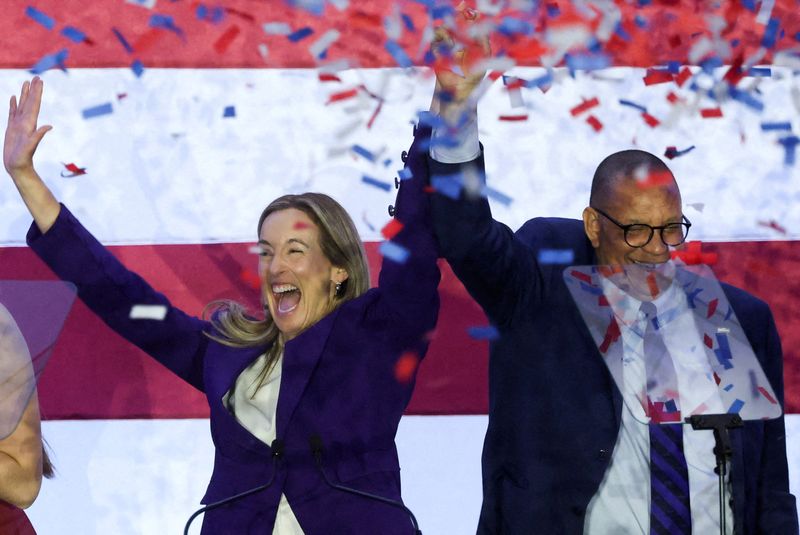By David Hood-Nuño, Jonathan Allen and Bianca Flowers
WASHINGTON (Reuters) -Democrats’ victories in Tuesday’s elections have exposed potential vulnerabilities in U.S. President Donald Trump’s hardline immigration agenda and bid to stamp out diversity, equity and inclusion policies, analysts said.
While the winners focused their campaign around cost of living issues, they also embraced the core tenets of DEI and wove them into their platforms.
In Virginia, Abigail Spanberger, the winner of the governor’s race, vowed to restore a voting rights amendment in the state’s constitution. The winner in the race for New Jersey governor, Mikie Sherrill, said in a primary debate that she believes LGBTQ education is essential for students, and not a subject parents should be able to opt out of.
New York City Mayor-elect Zohran Mamdani was the most outspoken, centering his economic platform on racial equity and economic justice. He spoke at the March on Wall Street in August led by Rev. Al Sharpton, Martin Luther King III and civil rights groups in a direct show of support for policies to help marginalized communities.
Mamdani’s decisive victory over former Governor Andrew Cuomo, a Democrat who ran as an independent, makes him the first Muslim and first person of South Asian heritage to hold the office.
“New York will remain a city of immigrants: a city built by immigrants, powered by immigrants and, as of tonight, led by an immigrant,” Mamdani, who was born in Uganda before his family moved to New York when he was a child, said in his election-night victory speech. “So hear me, President Trump, when I say this: To get to any of us, you will have to get through all of us.”
The White House declined to comment, but Trump on Wednesday repeatedly incorrectly labeled Mamdani a “communist.” Mamdani is a democratic socialist.
“They put America last, we put America first,” Trump said in a speech in Miami. He blamed the U.S. government shutdown for his party’s performance.
Since returning to power, Trump has tried to recast DEI as “racist” and “illegal,” through executive orders purging the federal government of offices and departments that were created to develop and enforce policies to remedy historical discrimination and inequities. He has also used the presidency to pressure private entities like companies, law firms and universities to recant their DEI principles.
REPUBLICANS LOSE LATINO VOTES
A swing to the left by Latino voters may also signal tension over Trump’s hardline immigration agenda, which was billed as an effort to pursue dangerous criminals but has also swept up U.S. citizens and people with no criminal record – some of them in dramatic raids involving Black Hawk helicopters and tear gas.
Sherrill won Passaic, the New Jersey county with the most Latinos, by 15 points on Tuesday after Trump won the county by three points last year, suggesting a Latino shift away from Republicans, said Mike DuHaime, a Republican strategist in New Jersey and former political director of the Republican National Committee.
“Democratic voters were just supremely motivated by what they see Trump is doing is wrong,” DuHaime said on the role of immigration in voter sentiment. “They believe that what Trump’s doing is wrong, and they’re looking for a fighter who will stand up to him, not somebody who will cooperate with him.”
Tuesday’s results were a broad repudiation of Trump’s heavy-handed immigration enforcement policy, as well as his attacks on DEI, said April English-Albright, legal director of Black Voters Matter Fund, a group that pushes for better voter access for marginalized and predominantly Black communities.
“He absolutely was on the ballot and he will remain on the ballot, in the hearts and minds of people until he is no longer in American politics,” she said. “People will see every election as an opportunity to push back.”
In both New Jersey and Virginia, more than 90% of voters who supported the Democratic candidates believed Trump’s anti-immigrant policies had gone too far, according to an exit poll conducted by SSRS for CNN and other news outlets. In New York, 70% of Mamdani voters said the next mayor should not cooperate with the Trump administration’s immigration policies.
DEMOCRATS TRY TO KEEP UP MOMENTUM
Whether the sentiments translate into victory for Democrats in next year’s midterm elections remains to be seen, analysts say.
“Whether the midterms are going to be a wave election that ushers in sort of fresh political voices and fresh political blood, or if it will be a rush to the center in order to protect against a further rightward lurch in the face of this administration,” is not yet clear, said Phillip Solomon, professor of African American studies and psychology at Yale University. “Winning the games you’re supposed to win does not suggest momentum — it just suggests that there hasn’t been a collapse.”
Polls show the Democratic brand remains unpopular and while Trump’s approval rating has dropped, voters remain split between the parties. A Reuters/Ipsos poll in late October found respondents were equally likely to say they would vote for a Republican or a Democrat for the House of Representatives if the election were held that day.
Still, tensions are running high in Black, Latino and Asian communities that have been on the front lines of the push against Trump’s diversity policies and they were also among groups with high turnout in Tuesday’s races, said former New York mayoral candidate Maya Wiley. Exit polls show Sherrill and Spanberger, for example, outperformed their Republican opponents by a nearly two-to-one margin among Latinos.
“Many of these places where these races are happening, people were directly impacted by the Trump administration’s very radical and extreme agenda,” said Wiley, president of The Leadership Conference on Civil and Human Rights.
(Reporting by David Hood-Nuño in Washington, Jonathan Allen in New York and Bianca Flowers in Chicago; Editing by Kat Stafford and Deepa Babington)

